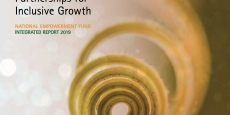Integrated Report 2017/18
Foreword by the Hon. Minister of Trade and Industry
As an agency of the dti, the National Empowerment Fund (NEF) promotes and supports commercially sustainable businesses that are owned and run by black people in order to promote and facilitate black economic equality and transformation across a range of sectors. Established by the National Empowerment Fund Act No. 105 of 1998, the Development Finance Institution (DFI) also encourages and inculcates a culture of savings, investment and meaningful economic participation by black people.
In February 2004, during the budget speech by the Minister of Finance, it was announced that the NEF would be capitalised by R10 billion over the next five years. The decision at the time was premised on such funding being realised through the sale of State Owned Enterprises. Trust capital of R2.47 billion and operational funding of R322 million were transferred between 2004 and 2010 to the NEF as well as R1 billion raised in 2007 from equity through the Asonge Share Scheme (MTN). The NEF has not secured additional capital from the fiscus since then despite numerous MTEF applications.
Since inception the NEF has approved 927 transactions worth more than R9.3 billion for black-owned and managed businesses across the country. Of this, R3.4 billion has been approved for the empowerment of businesses that are owned and managed by black women entrepreneurs. A total 76% of NEF-funded transactions are still active and operational in the economy. Central to the work of the NEF is the need to create decent jobs, and the institution has supported in excess of 95 798 jobs countrywide, with new jobs totaling over 65 359. We recognise appreciably that the over the years the NEF has made concerted strides to improve recoverability of the portfolio through various post investment support of its investees. These include focused mentorship and proactive turnaround, workouts and restructuring interventions. As a result over R2.8 billion has been collected cumulatively from loans disbursed across the country since operational inception.
Having come down significantly from 24.4% some two years prior, the portfolio impairment ratio of 15.4% at year end is a remarkable milestone that compares favourably with other DFIs.
As an early proponent of efforts to support the emergence of black industrialists, in partnership with local and international partners the NEF has developed 27 strategic and industrial projects valued at R27 billion across sectors identified in both the Industrial Policy Action Plan and the National Development Plan, spanning Renewable Energy, Mineral Beneficiation, Agro-processing, Information and Communication Technology, Infrastructure and Tourism.
As outlined in this Integrated Report 2018, the NEF continues to point the path on deal-structuring for maximum benefit to black entrepreneurs, investor education, entrepreneurial training, incubation, rural and community development, powering township economies, on mentorship and across the tapestry of its mandate.
As at March 2018 the net asset value of the NEF was R5 billion, which means that the NEF has managed to leverage a net appreciation of its assets to the value of R2.5 billion. The NEF has therefore doubled the initial capital received from Government.
It is for this reason that Government remains committed to resolving the protracted challenges of recapitalising the NEF speedily and sustainably not only to prevent a moratorium on funding new applications, but precisely to respond to the overwhelming demand for funding among black entrepreneurs and to help the economy grow. As Government intensifies efforts to bring about radical socio-economic transformation, a fully-resourced NEF is poised to become a leading instrument in that quest. With the considerable skills base that the NEF commands across its echelons, including the executive and board strata, there is no doubt that the NEF will continue to shine the path in South Africa’s determination to bring about inclusive growth.
the dti acknowledges the profound contributions of the previous board of the NEF, and is privileged to welcome the newly appointed trustees, certain that their stewardship of the organisation will steer the development financier to even greater heights






